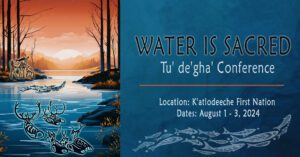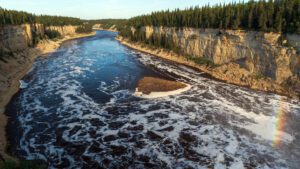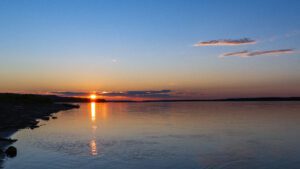A major three-day conference on the health and volume of water in the NWT starts tomorrow in Kátl’odeeche First Nation (KFN), examining the downstream results of upstream mining mega projects and hydro dams.
Keepers of the Water has partnered with the First Nation and the Canadian Association of Physicians for the Environment to host the 2024 Tu’de’gha’ Conference at the Chief Lamalice Complex.
 George Mackenzie is the newly elected Dene National Chief.
George Mackenzie is the newly elected Dene National Chief.
“What I’m hearing, what we see, is the water downstream is getting worse, it’s not healthy water,” he says.
“We have to do something already, today. We need to put a lot of effort into it. So much effort … this water conference has to be like a movement. Like it was with the Berger Inquiry, which was just about oil. This is about water, we all need water.”
Keepers of the Water are First Nations, Métis, Inuit, environmental groups, concerned citizens, and communities working together for the protection of water, air, land, and all living things within the Arctic Ocean Drainage Basin.
The Keepers of the Water movement was born during the first Keepers of the Water Gathering in Li´dli?i? Ku´e´ (Fort Simpson) in September 2006.
This Gathering was called because people living in the Mackenzie River basin were becoming alarmed by reports of increased turbidity and toxicity and decreased volume of water in their watershed.

Alexandra Falls at Twin Falls Gorge Provincial Park several years ago. (Photo courtesy Tim Schofield via Adobe Stock Images)
They wanted to know what was happening to the water and the ecosystems that relied upon it.
Tori Cress speaks for Keepers of the Water.
“Water knows no boundaries. We have to do the work. It’s affecting people downstream. The pollution is reaching further and further. The Arctic Ocean is like a carbon sink where all this pollution and toxicity collects. And it’s happening in Alberta and just spreading everywhere,” she says.
“Indigenous people were the first scientists of our territory. We already know, historically, what was done. And we know what needs to be done, because we still live on the land. It’s really hard to hear those stories about people about how they used to be able to dip a cup in the water.”
A chiefs’ panel kicks off the conference tomorrow, with Mackenzie, KFN Chief April Martel, Dehcho Grand Chief-Herb Norwegian, Wet’suwet’en Hereditary Chief Namoks, Sahtú Dene Council Grand Chief Wilbert Kochon.
The conference also has an Elders Panel, Youth Panel, more speakers, some guided activities, a film screening and evening entertainment.
The KFN Handgames Tournament, which starts Friday, will provide some thrilling entertainment for attendees of the conference.
– With files from Mariah Caruso

Mackenzie River at sunset near Fort Simpson in 2022. (Photo courtesy Tim Schofield via Adobe Stock Images)





